Britain, France Cite ‘Credible Evidence’ Of Chemical Warfare In Syria; US Continues To Verify Allegations

Britain and France have informed the U.N. that there is credible evidence pointing to the use of chemical weapons in Syria on more than one occasion since December, diplomats said on Thursday.
In letters to the U.N. Secretary General Ban Ki-moon, Britain and France said soil samples, witness interviews and opposition sources support charges that nerve agents were used in and around the cities of Aleppo, Homs and possibly Damascus, officials who spoke on the condition of anonymity told the Washington Post.
Last week, Syria had accused the U.N. of attempting to broaden a probe into an alleged chemical attack in the village of Khan Al-Assal in Aleppo province to the rest of the country, adding that the government would not approve the entry of the U.N. experts.
Syria had requested the U.N. last month to investigate the alleged chemical weapons attack Mar. 19 on Khan Al-Assal. The Syrian government and rebel forces blame each other for the incident.
However, on Apr. 9, the Syrian government said it “regrets” that Ban had yielded to external pressures “to divert the consultations in this regard from their real context,” official Syrian news agency SANA stated.
“Syria couldn't accept such “maneuvers” by the U.N., taking into consideration the real negative role, which it played in Iraq that paved the way for the U.S. invasion,” SANA stated citing a Syrian Foreign Ministry source.
The source added that Syria is willing to cooperate with a U.N. observer mission limited to Khan Al-Assal.
U.S. intelligence officials are also looking into the possibility that chemical weapons may have been used in Syria, although there has been no consensus, an unnamed senior U.S. official told Reuters news agency on Thursday.
The U.S. Director of National Intelligence James Clapper told at a Senate hearing on Thursday that the claims that the U.S. authorities receive on chemical warfare in Syria each day are taken “seriously, and we do all we can to investigate them.”
Clapper declined to make public what the U.S. intelligence community had concluded about allegations, citing the sensitivity of the matter.
A U.S. conclusion asserting the allegations of chemical warfare in Syria would increase pressure on the Obama administration to step up assistance to the Syrian opposition.
Syria is believed to own one of the largest undeclared stockpiles of chemical and biological weapons in the world, including the sarin nerve agent, mustard gas and cyanide, the U.S. officials said, as reported by the New York Times.
According to an intelligence report to the U.S. Congress covering January to December 2011, Syria has had a chemical weapons (CW) program “for many years and already has a stockpile of CW agents, which can be delivered by aerial bombs, ballistic missiles, and artillery rockets.”
© Copyright IBTimes 2025. All rights reserved.






















